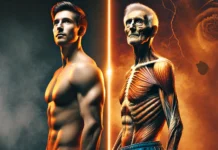Understanding the Importance of Vitamins for Men’s Health
Vitamins play a crucial role in maintaining optimal health and well-being, especially for men who want to support longevity, hormone balance, and vitality. As the body ages, nutrient absorption declines, making it essential to obtain key vitamins through diet and supplementation. These essential nutrients contribute to various physiological functions, including testosterone production, cardiovascular health, immune defense, and cognitive function. For men in their late 30s and beyond, focusing on the right vitamins can enhance quality of life, reduce the risk of chronic diseases, and support overall well-being.
You may also like: How to Increase Testosterone Levels Naturally: Science-Backed Strategies for Men’s Health & Longevity
With busy lifestyles, stress, environmental toxins, and dietary deficiencies becoming more prevalent, men must take proactive steps to ensure their bodies receive the necessary vitamins for optimal function. While a well-balanced diet remains the foundation of good health, supplementation can fill nutritional gaps and provide targeted benefits. The best supplements for men in their late 30s include key vitamins that support energy metabolism, muscle health, and hormone regulation. By understanding the role of essential vitamins, men can make informed choices that enhance their health, ensuring longevity and peak performance.

Vitamin D: The Foundation of Hormonal Health and Longevity
Vitamin D is a powerhouse nutrient that plays a fundamental role in men’s health. It is often referred to as the “sunshine vitamin” because the body synthesizes it in response to sunlight exposure. However, with modern indoor lifestyles and limited sun exposure, many men suffer from vitamin D deficiency, leading to a cascade of health issues, including weakened bones, low testosterone levels, and increased susceptibility to infections.
This essential vitamin is a critical regulator of calcium absorption, ensuring bone density remains intact as men age. Osteoporosis is often associated with women, but men are equally at risk of bone fractures and deterioration if they do not maintain adequate vitamin D levels. Beyond bone health, vitamin D significantly influences hormone production, particularly testosterone. Studies have shown that men with optimal vitamin D levels tend to have higher testosterone levels, which directly impact muscle growth, fat metabolism, and overall vitality.
In addition to its role in hormone health, vitamin D has been linked to longevity and disease prevention. Low vitamin D levels have been associated with an increased risk of cardiovascular disease, cognitive decline, and metabolic disorders such as type 2 diabetes. Given its widespread impact on health, men should prioritize vitamin D intake through sun exposure, fortified foods, and supplementation. The recommended daily intake varies, but many experts suggest at least 1,000-2,000 IU per day, with blood tests helping determine individualized needs. Ensuring adequate vitamin D levels can enhance immune function, mood stability, and long-term health outcomes, making it a crucial component of a man’s wellness strategy.
Vitamin B Complex: Energy, Cognitive Function, and Stress Management
The B-vitamin family consists of eight essential vitamins that play an integral role in energy metabolism, nervous system function, and brain health. These water-soluble vitamins include B1 (thiamine), B2 (riboflavin), B3 (niacin), B5 (pantothenic acid), B6 (pyridoxine), B7 (biotin), B9 (folate), and B12 (cobalamin). Together, they support a range of physiological processes, ensuring that men maintain mental sharpness, cardiovascular health, and optimal hormone production.
One of the most critical functions of the B vitamins is their role in energy production. These vitamins help convert carbohydrates, fats, and proteins into usable energy, making them essential for men with active lifestyles or demanding careers. Vitamin B12, in particular, is vital for red blood cell formation and oxygen transport, preventing fatigue and maintaining stamina. A deficiency in B12 can lead to anemia, characterized by weakness, lethargy, and cognitive decline.
Beyond energy metabolism, B vitamins contribute to neurotransmitter function, enhancing mood and stress resilience. Vitamin B6, for example, is involved in serotonin and dopamine production, two neurotransmitters that regulate mood, motivation, and emotional well-being. Men experiencing high levels of stress, anxiety, or depression may benefit from adequate B-vitamin intake to support their nervous system.
For optimal health, men should consume a balanced diet rich in B-vitamin sources, including whole grains, lean meats, dairy, eggs, and leafy greens. However, due to modern dietary habits, many men may not receive adequate levels, making supplementation a practical option. Ensuring sufficient B-vitamin intake promotes cognitive function, cardiovascular health, and overall vitality, making it an essential aspect of men’s wellness.
Vitamin C: Immune Support and Antioxidant Protection
Vitamin C is well-known for its role in immune function, but its benefits extend far beyond warding off colds and infections. This potent antioxidant plays a crucial role in reducing oxidative stress, supporting collagen production, and enhancing iron absorption, all of which are vital for men’s long-term health.
One of the most significant functions of vitamin C is its ability to neutralize free radicals, preventing cellular damage that contributes to aging and chronic diseases. Men exposed to environmental pollutants, stress, and poor dietary choices can experience increased oxidative stress, leading to inflammation and a higher risk of cardiovascular disease. By incorporating adequate vitamin C into their routine, men can protect their cells from damage and promote longevity.
Collagen synthesis is another critical aspect of vitamin C’s role in health. As men age, collagen production declines, leading to joint stiffness, weakened connective tissues, and slower recovery from injuries. Ensuring optimal vitamin C intake supports tissue repair, enhances skin elasticity, and maintains joint health, making it particularly beneficial for active individuals.
While citrus fruits, bell peppers, and leafy greens are excellent dietary sources of vitamin C, supplementation can provide additional support, especially for men with high-stress lifestyles or those who engage in intense physical activity. The recommended daily intake varies, but doses of 500-1,000 mg per day have been shown to provide robust immune and antioxidant benefits. By prioritizing vitamin C intake, men can fortify their immune defenses, reduce inflammation, and support overall well-being.
Vitamin E: Heart Health and Cellular Longevity
Vitamin E is a fat-soluble antioxidant that plays a vital role in protecting cells from oxidative stress, supporting heart health, and maintaining skin integrity. This essential nutrient works by neutralizing free radicals that contribute to chronic inflammation and age-related diseases. For men in their late 30s and beyond, maintaining adequate vitamin E levels is crucial for cardiovascular function and overall longevity.
One of vitamin E’s primary benefits is its ability to improve circulation and reduce the risk of blood clot formation. This helps lower the likelihood of heart attacks, strokes, and other cardiovascular complications. Additionally, vitamin E supports healthy cholesterol levels by preventing the oxidation of LDL cholesterol, a process that contributes to arterial plaque buildup.
Beyond heart health, vitamin E plays a significant role in maintaining youthful skin and cellular function. It helps protect skin cells from UV damage, pollution, and environmental stressors, reducing signs of aging and supporting skin hydration. This makes it a valuable nutrient for men who want to maintain a healthy and youthful appearance.
Dietary sources of vitamin E include nuts, seeds, vegetable oils, and leafy greens. However, supplementation can be beneficial, particularly for men with higher oxidative stress levels due to smoking, pollution exposure, or intense exercise. The recommended daily intake ranges from 15-30 mg, depending on individual needs. By incorporating vitamin E into their health regimen, men can enhance cardiovascular function, cellular protection, and overall vitality.

Frequently Asked Questions (FAQ): Essential Vitamins for Men’s Health
1. Why are essential vitamins important for men’s overall health?
Essential vitamins for men play a crucial role in supporting various bodily functions, including metabolism, immune response, and cardiovascular health. Without adequate vitamin intake, men may experience deficiencies that can lead to fatigue, weakened immunity, and long-term health complications. Certain vitamins, such as vitamin D and B12, are particularly vital for energy production and hormone balance. Maintaining proper vitamin levels can also enhance cognitive function, reducing the risk of age-related mental decline. By incorporating the 5 essential vitamins for men into a daily routine, one can promote longevity and overall well-being.
2. What are the best supplements for men in late 30s?
As men enter their late 30s, their bodies undergo physiological changes that require targeted nutritional support. The best supplements for men in late 30s include vitamin D for bone health, magnesium for muscle function, and omega-3 fatty acids for heart and brain health. Additionally, CoQ10 is beneficial for cardiovascular function, and probiotics help maintain gut health. Taking a well-rounded supplement regimen can help prevent deficiencies and support long-term vitality.
3. How do the 5 essential vitamins for men support hormone balance?
Hormone balance is critical for men’s health, particularly as testosterone levels begin to decline with age. Vitamin D plays a key role in testosterone production, while vitamin B6 helps regulate hormones by supporting neurotransmitter function. Zinc is another essential nutrient for testosterone synthesis and immune health. Magnesium aids in muscle recovery and relaxation, indirectly supporting hormone regulation. Ensuring sufficient intake of these essential vitamins for men can help maintain optimal hormone levels and overall well-being.
4. Are there natural food sources for the best supplements for men in late 30s?
Yes, many essential vitamins for men can be obtained through a balanced diet rich in whole foods. Fatty fish, eggs, and fortified dairy products are excellent sources of vitamin D, while leafy greens and nuts provide ample magnesium. Whole grains, poultry, and bananas supply vitamin B6, and zinc can be found in shellfish, red meat, and legumes. However, for those who struggle to meet their daily requirements through diet alone, supplements can provide a convenient alternative.
5. What are the signs of vitamin deficiencies in men?
Vitamin deficiencies can manifest in various ways, depending on which nutrient is lacking. Common signs include persistent fatigue, muscle weakness, frequent infections, and poor concentration. A deficiency in vitamin D may lead to bone pain and low mood, while insufficient B12 can cause tingling sensations and cognitive decline. Low zinc levels may impair immune function and wound healing. Addressing these deficiencies by incorporating the 5 essential vitamins for men can help restore balance and improve overall health.
6. How can men optimize vitamin absorption?
To maximize the absorption of essential vitamins for men, it is important to pair specific nutrients with the right foods. For example, vitamin D is fat-soluble, meaning it is best absorbed when consumed with healthy fats like avocado or olive oil. Iron is better absorbed when taken with vitamin C-rich foods, such as citrus fruits. Magnesium and calcium should be taken separately, as they compete for absorption. Ensuring proper dietary combinations can enhance nutrient uptake and effectiveness.
7. Can too many supplements be harmful?
While supplementation is beneficial, excessive intake of certain vitamins and minerals can lead to adverse effects. Overconsumption of vitamin D may cause calcium buildup in the blood, leading to kidney issues. High doses of vitamin A can result in toxicity symptoms such as dizziness and liver damage. It is essential to follow recommended dosages and consult a healthcare provider before significantly increasing supplement intake. The best supplements for men in late 30s should be taken in balanced amounts to avoid potential health risks.
8. How do lifestyle factors affect vitamin needs?
Lifestyle choices such as diet, physical activity, stress levels, and sleep patterns can influence the body’s vitamin requirements. For example, men who engage in intense physical activity may need additional magnesium and B vitamins to support muscle recovery. High stress levels can deplete vitamin C and B-complex vitamins, requiring increased intake. Those with limited sun exposure may need higher doses of vitamin D. Adjusting supplement intake based on lifestyle factors ensures optimal nutrient balance.
9. Do men need different vitamins than women?
Yes, men and women have distinct nutritional needs due to differences in physiology and hormone levels. Men typically require higher amounts of vitamin D, zinc, and magnesium to support testosterone production and muscle function. In contrast, women may need more iron due to menstrual blood loss. While both genders benefit from a balanced diet, tailoring vitamin intake to specific biological needs ensures optimal health outcomes. The 5 essential vitamins for men focus on supporting male-specific functions such as muscle strength, energy production, and reproductive health.
10. How can men maintain vitamin levels as they age?
As men age, their ability to absorb and utilize vitamins efficiently declines. To maintain optimal vitamin levels, it is important to adopt a nutrient-dense diet, engage in regular physical activity, and manage stress effectively. Routine health check-ups can help monitor vitamin levels and identify potential deficiencies early. Supplementing with the best supplements for men in late 30s, such as vitamin D, omega-3s, and magnesium, can support long-term health. Proactive nutritional planning can help sustain energy, cognitive function, and overall well-being well into later years.

Conclusion: Optimizing Men’s Health with Essential Vitamins
Ensuring optimal vitamin intake is one of the most effective ways for men to support longevity, hormone health, and vitality. The five essential vitamins discussed—Vitamin D, B Complex, C, and E—provide targeted benefits that enhance energy levels, strengthen the immune system, and protect against chronic diseases. By prioritizing these nutrients through diet and supplementation, men can optimize their health and performance well into their later years.
men’s nutritional needs, longevity and vitamins, testosterone boosting nutrients, best supplements for vitality, hormone balance support, vitamins for male energy, immune-boosting supplements, antioxidant support for men, cardiovascular health supplements, natural ways to boost testosterone, optimal vitamin intake, supplements for muscle recovery, healthy aging strategies, essential micronutrients for men, natural hormone regulation, reducing oxidative stress, vitamin-rich diet for men, cognitive function support
Further Reading:
Essential Supplements For Men’s Health And Vitality
Prolonging healthy aging: Longevity vitamins and proteins
The 14 Best Anti-Aging Vitamins and Supplements
Disclaimer: The information provided in this article is for general informational purposes only. The content does not constitute professional advice of any kind, including but not limited to medical, legal, or financial advice. HisHealthMag and its contributors make no representations or warranties regarding the accuracy, completeness, or reliability of the information presented. Always seek the advice of a qualified professional for any specific concerns or questions you may have. Neither HisHealthMag nor its authors assume any responsibility or liability for any actions taken based on the information provided in this article. The views and opinions expressed are those of the author(s) and do not necessarily reflect the official policy or position of HisHealthMag.





